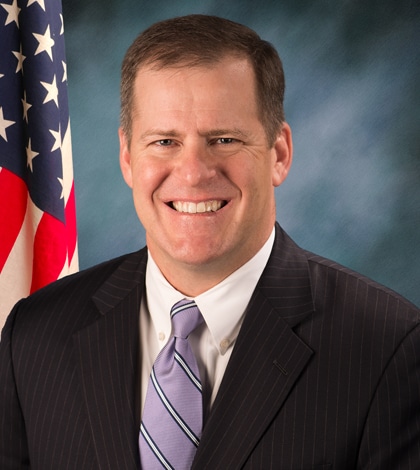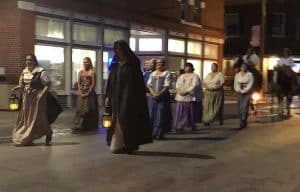Schimpf reviews spring legislative session

State Sen. Paul Schimpf (R-Waterloo)
State Sen. Paul Schimpf (R-Waterloo) accomplished five of his eight legislative priorities for the spring legislative session.
The other three items, including a proposal regarding the Southwest Illinois Connector, failed.
Three of the eight items on Schimpf’s to-do list were included in the state budget passed last week. Those items were funding for bond payments the state owed to Sparta, providing backpay for state workers promised a bonus in 2008 and a buyout proposal similar to one Schimpf suggested to help reduce pension debt.
Additionally, Schimpf called two more items from his agenda an “unqualified success.”
First, he got Southern Illinois University Carbondale to agree to conduct strategic planning studies for the World Shooting and Recreational Complex in Sparta and Pyramid State Park in Perry County. Schimpf decided to go that route over pushing legislation through the General Assembly.
Schimpf also succeeded in getting legislation passed that expanded the opportunities active duty military personnel and their spouses have to obtain teaching licenses.
It was not all wins for Schimpf, however, as he had three priorities he described as items he “didn’t have 100 percent success on.”
One of those items was Schimpf’s resolution to create the Southwest Illinois Connector Task Force that stalled in the House. The bill passed in the Senate on May 10 and is currently awaiting a vote in the Illinois House of Representatives.
“The grade is incomplete at this point,” Schimpf said of the bill.
The resolution calls for the study of the cost, feasibility and environmental impact of a proposed four-lane divided highway from Waterloo to Murphysboro. The study would also assess the short and long-term economic impact to the region, and public and private options for funding.
“I’m disappointed that both houses were unable to complete the action on this resolution prior to adjournment,” Schimpf said. “The lack of urgency in Springfield regarding our region’s infrastructure remains one of my greatest frustrations.”
Legislators will not be able to vote on the bill until the fall veto session at the earliest, which takes place Nov. 13-15 and 27-29.
Schimpf said he expects the bill will get a vote and pass eventually, but the delay causes problems.
“The problem is that task force legislation has some fairly aggressive timelines where we are supposed to be submitting a report (on Dec. 31),” Schimpf explained. “If we can’t get it out of the house until the fall veto session, we may not be able to meet those timelines.”
Schimpf said he plans to meet with grassroots supporters of the project to discuss next steps.
Schimpf said they might decide to restart the process in the spring session, or attempt to move rapidly if the bill passes in the fall.
The latter option comes with a number of challenges, as various agencies to begin work on the project and hold meetings before the bill is passed.
“We haven’t decided which way we are going to go on that yet,” Schimpf said.
Another item on his list was to create tax credits for businesses who hire graduates from the state’s university system.
That bill did not get a hearing in the revenue committee in the Senate because the committee chairwoman enacted a policy saying she would not advance a bill with tax credits in it. Schimpf said she felt the state did not have enough income revenue for such bills.
“One of the things I’ve learned the hard way is there are three things I can do as a state senator: I can introduce legislation, I can speak for or against legislation, whether it’s in committee or on the floor for a vote, and I get to cast my vote (for legislation), but I cannot make legislation move,” Schimpf said. “Legislation only moves through the Illinois senate if it has the support of (Illinois Senate) President Cullerton or his leadership team.”
A final item on Schimpf’s agenda that failed to pass was a proposal to combine the state offices of comptroller and treasurer and eliminate the office of the Lieutenant Governor.
“I just didn’t get any traction on that at all,” Schimpf said. “I still believe that would be a good idea to do, but that was probably the one I was least successful on as far as getting people to agree to that idea.”
“The political establishment in both parties is very reluctant to eliminate offices they currently control,” he added.
Aside from his planned agenda, Schimpf said his biggest success was his work with the Illinois Higher Education Working Group.
The bipartisan, bicameral group produced two items that made it into the state’s budget. The first of those made it so the state guaranteed funding for students who get a Monetary Award Program grant for four years instead of one.
The grant is awarded to students who display financial need..
“These changes help level the playing field with out-of-state schools that are poaching Illinois’ best and brightest,” Schimpf said. “This will also help make college more affordable for the middle class and provide cost certainty to students and their families.”
The other legislative output of the group was a program that allows the state to offer more scholarship money to students if universities match the state’s funding for those awards.
Looking ahead, Schimpf anticipates some work being required to finish the recently passed budget. He also said the Senate may have to vote on override attempts by the governor on gun control legislation.
In the meantime, Schimpf said he will not return to Springfield until November, so if constituents would like to talk with him they can schedule a meeting at his office in Waterloo.






